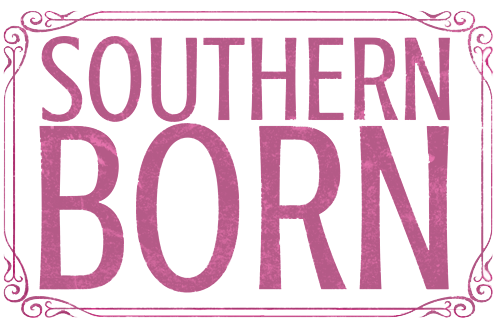Start reading this book:

Share This Excerpt
Sutter Knight slipped down the alley behind Main Street—fewer people to possibly recognize her since she wanted to keep her quick visit on the down low—and hesitated outside the faded side double doors of the Sweet Tea Gallery Theater. In her day, the doors had been a bright and glossy red. She’d painted them one weekend, obsessed with her dreams of stardom, glitz, glamor, and Music with a capital, all in bright lights M.
With one finger she traced a long scratch in the weathered, whitened color, and she bit back a sigh. She’d been impossibly naïve about talent, the country music business, and love. Well, maybe not talent and music since technically, if not over the hump and breaking out of the pack, she was pretty darn close—cracking the top ten on the country charts and iTunes could do that for a girl—but as for love… Sutter still felt a heart pang when she remembered her youthful optimism.
Curious, Sutter reached up above the door thinking that Dawson’s teenage impulse would have been pressure-washed away years ago, but no, there it was—exactly as she remembered—scratched into the nearly ninety-year-old brick.
I will Love Sutter Knight
4Ever and Ever
Amen
Well, Dawson’s use of Randy Travis’s famous lyrics hadn’t proved much. His love may have lasted through middle school and high school—hardly forever but far longer than any other relationship she’d managed. Not that she’d managed more than a few dates and stolen kisses at backstage parties since she’d arrived in Nashville with her two guitars, a backpack of clothes, and her songwriting journals more than ten years ago.
“Me or music,” Dawson had demanded that last night, sheets of rain drenching them. The creek rising. The planes of his face hard. His fingers had been cold when he’d held her arms and his eyes had glittered with tears or anger—she hadn’t been able to tell which. “Choose.”
And she had.
Only it hadn’t really been a choice.
And the boy who’d asked her to make that choice hadn’t really loved her, right? That’s what she’d told herself at the time and later.
Who knew what love was anyway? Sutter nibbled her lip and traced the lines between the theater’s bricks. Certainly not at seventeen. She’d be twenty-eight this month and she still didn’t know.
She smiled at the irony.
Her reviews proclaimed her to be a country music artist with a voice that ached with emotional honesty, so it was awkward to admit she didn’t understand love. Sorrow? Check. Disappointment? Check. Loneliness? Heck yeah, but underneath it all, her love of music had lasted far longer than Dawson. And her determination to succeed as a Nashville-based country artist, both as a songwriter and singer, had sustained her through the years of missing her family, Dawson, and her beloved hometown: Sweet Tea, Tennessee.
So it had come as a bit of a surprise that now, when she was on the cusp of achieving her dreams, and had just finished her first tour where she was the headliner, Sutter felt a little let down.
She’d expected to feel happy. Confident. A sense of completion and certainty. Instead, doubt gnawed.
And so she’d come back to Sweet Tea. She was so grateful for her roots. So much of her music, always written from her heart, came from her Sweet Tea beginnings—a melody riff from a Carolina wren, or blue-headed vireo; imagery from her long hikes in her beloved Eastern Smoky Mountains; her enduring love for Dawson, who had always been so much more to her than a boyfriend; fun times and tears with her four sisters; and of course, all the lessons and knowledge and advice she’d received growing up from her beloved music teacher, Carol Reynolds.
Seeing Carol again in Sweet Tea was why she was here. Oh, she’d seen Carol many times since she’d moved to Nashville. Carol had visited her in Nashville and had attended concerts as her guest, but Sutter hadn’t been back to Sweet Tea. Too many memories, and she’d been afraid that her determination to stick it out and succeed would wobble if she came home too soon. At seventeen she had not realized how hard it would be.
She was due back in the studio in a couple of weeks, but she thought a few days talking and baking with Carol, and watching her teach her new crop of high school students on the Sweet Tea Gallery stage—maybe even acting as a bit of a guest mentor—would set her to rights. Also it had been too long since she’d walked the trails of her beloved Eastern Smoky Mountains. She and Dawson had hiked and picnicked in the national park every chance they had.
Sutter knew moving to Nashville had been the right thing to do to build her career, but leaving Dawson, leaving the closeness she had with Carol who had become a surrogate mother, and leaving her beloved town and forest had been tough. Nashville still felt too frenetic. Too loud. Too bright. Too anonymous.
She leaned against the side theater door and looked up at the early spring blue sky and smiled. She’d thought seeing more of the country would be fun. Instead she’d felt a little overwhelmed and disconnected. She’d thought performing every night to cheering fans would energize and fulfill her. But it had only emphasized her loneliness.
Small-town girl to my core.
Yes, it was time she came home. She had so much to be grateful for and so much to look forward to. She’d worked so hard and had come so far. This had been her breakout year. Country music stars and pop stars were reaching out to her to collaborate with them on songs. After she’d performed one of her singles on a vocal competition show, she’d had the number one song on iTunes and three of her singles off her last album had cracked the top ten this year.
So where was her swagger?
Sutter nearly laughed imagining that. Not her style. She still had lots of work to do, and she knew it.
She still had to keep climbing up that hill.
She hummed the first verse of what was still one of her favorite songs, softly singing the chorus to Miley Cyrus’s The Climb.
How many times had she sung that in the shower, on Nashville street corners and open mics? Someday she wanted to write an iconic song that would tell her story, but not about the boy she’d left behind.
She was being silly. She’d come to surprise Carol Reynolds and soak in the atmosphere of her beloved theater where she’d had so many wonderful memories of rehearsing and performing. She had not come to think about Dawson; although, he had been as invested in music and the theater as she had been until he’d tossed it all away for other dreams—dreams that had not included her.
She definitely needed to lay the ghost of her love for him to rest.
Besides, Dawson must be long gone.
Not too many architects in Sweet Tea, Sutter imagined, still a little stunned that a charismatic actor and vocalist who could effortlessly switch from musical theater to jazz to pop to country would dump the spotlight for a desk job. Impatient that her mind still dredged up thoughts of Dawson, Sutter turned the brass handle. Locked. She looked at her watch. It was early—first period hadn’t started yet, but Carol often taught lessons at the theater before school started. The theater was usually open at dawn as there was always work to do—cleaning, building props, working on costumes.
Sutter tried again, not believing the side door would be locked on a weekday morning. Carol held her music classes here—the choirs, the drama, the musical theater. The high school didn’t have a performing arts space or a music room. The theater was it. She knew Carol hadn’t retired. She couldn’t imagine that day ever coming. The kids of Sweet Tea needed her.
Sutter still needed her.
She turned it again and put her weight into it. Nothing. Not even a rattle in the frame. Puzzled, Sutter regarded the door. Dawson and she used to sneak in during high school. He’d used a paper clip. Later he’d even had a tool from a construction site where he worked that unlocked the door like a charm.
She looked in her huge red leather glittery bag. Lordy, in all the heaps of brushes, lemon verbena hand cream, tampons, an apple and granola bar, and her signature red lipstick, she didn’t have anything remotely useful to pick the lock.
“Not quite famous country singer tries to break into the theater where it all started,” Sutter sang under her breath with a true country twang. She should abandon the surprise element and just knock, but as she reached out to do so, someone yelled at her.
“Hey!”
Sutter jumped. A man she’d never seen before stood at the end of the alley. He wore an orange vest, jeans, and hard hat.
“You startled me.”
“Theater’s closed.”
Obviously.
Sutter walked toward him reluctantly. She’d wanted to surprise Carol when she was teaching. Not let the town know Sutter Knight, rising country music star with a Country Music Award nomination as the New Country Artist and Single Record of the Year, was in town. Not that she was high on herself. She hadn’t actually won either award, and still felt as pleased as a child at Christmas that her song been nominated alongside those of her long-time idols. She’d even performed at the award ceremony with Carol as her guest.
“Hi,” Sutter said, stopping in front of the construction worker and looking at him carefully. He didn’t look familiar. She hadn’t gone to school with him. She didn’t think Sweet Tea had grown that much that there would be too many strangers. “Can you please tell me why?”
“Demolition.” He looked at her, clearly impatient and not impressed with her expensive hair blowout, red leather cowboy boots that were inlaid with crystals, and white peasant-style dress. The garment draped softly down her body and slipped off her professionally spray-tanned shoulders that her manager had insisted she get done for the tour.
“Excuse me?” Sutter couldn’t have heard that right.
“Yup, this old beast is coming down in a couple of weeks. Make way for the future.”
The future. Sutter felt faint. It was a mistake. Had to be. He must mean a different building in Sweet Tea. Or that the theater was being restored. Goodness, it had leaked when she’d been in high school. And the mold sometimes—not enough Febreze stocked in the store to cover that. Sweet Tea was a historical town. One of the earliest settled towns in Tennessee. They had a Sweet Tea Heritage Parade every May Day. They didn’t tear down their history.
“I’m sure you’re mistaken.” Sutter tried to hold on to her smile. “What building do you mean? This is the Sweet Tea Gallery Theater. Some of the biggest acts in country music played here back in the day,” she told him.
“That what it’s called?” The man looked unimpressed at the battered side brick exterior at the alley corner.
How could he not know?
Sutter stared at him in dismay. “This theater is one of the oldest theaters still in use in Tennessee.” She drew herself up to her full five foot six: short in her family, but with the boots she was at least five eight and even though she was a natural platinum blonde, she made sure people—men in particular—knew she was not dumb nor a pushover.
“Not in use anymore, sweetie.” The man sounded as if he were silently saying ‘good riddance,’ and Sutter bridled.
She felt that he was dismissing all the history the same way he would if he dropped a penny and walked on.
“Boss says it’s coming down. It’s coming down.”
“What?” Sutter’s voice felt strangled.
“You best be getting along now. I have to put up the caution tape and the boss will ride me real hard if I don’t get everything done this morning.”
“But who? What?”
“Get going. Nothing here. The theater’s empty except for junk.”
Junk! Empty!
Sutter could barely process any of it, but she realized that the construction worker was now walking behind her forcing her to walk back down to Main Street as if she were a cat he was herding somewhere. He was mistaken. He had to be.
“But where is Carol Reynolds teaching then?”
“Who?”
Sutter stared at him as if he spoke a foreign language. And she hoped he did, because she didn’t understand any of it. He was wrong. He had to be wrong.
Feeling off balance, Sutter turned toward the high school, but the thought of that impressive brick building on Randall Hill Road that overlooked the town and of so many people who would recognize her when all she’d wanted was a moment to quietly reconnect with Carol and perhaps meet a few music students, overwhelmed her. She checked her watch again as if the last minute had turned into ten. She certainly felt like it had.
Maybe she could catch Carol at home. Or she could at least make herself some tea or coffee before facing the high school. Carol had always insisted she keep a key to her house ‘in case you ever want to come home.’ Poor Carol!
Just thinking about Carol being kicked out of the theater cleared Sutter’s head. Carol hadn’t told her about the theater closing or being torn down. That’s because it wasn’t true!
Sutter quickly walked down the three blocks of Silver Maple Street where Carol’s small bungalow was on a corner lot. Sutter knew Carol had bought the house because of the lot. Her garden was larger than her house.
“Sutter Knight!” Carol was already out of her gate and hustling up the street. “Baby girl.” Sutter ran the last block, caught Carol in a hug and practically picked her up off the ground.
Carol laughed. “This is a mighty surprise! Look at you! I didn’t know your tour was finished. I thought you were still in the Carolinas.”
“I’m home now,” Sutter said without thinking.
Carol’s smile faded. “Sutter?”
“I mean the tour’s done. I’m booked into a studio in two weeks and I’ve been working on so many new song ideas. I have so much new material my head’s spinning, and well…” Sutter shrugged, suddenly self-conscious when she’d never been that way before. “I thought it was time I came to you for a little visit. I know I didn’t call or…” Sutter broke off suddenly wondering if one of her impulses had landed her yet again in a bit of hot water.
“You don’t need to call, Sutter. You always have a place here. You’re family.”
Sutter smiled, relieved.
“You still have the key?”
She nodded. “Okay, I have a meeting this morning I need to get to.”
“Don’t you have class?”
Carol Reynolds hesitated. “Later today,” she said. “The students would love it if you could stop by one day if you have the room in your schedule or the inclination.”
“Of course. I…”
“We can talk about it today over dinner. I expect you have a lot of people to visit, and I know you’ll want to take a walk through Founder’s Park and the woods. Lots of memories there.”
Sutter felt like Carol was shooing her away.
“What’s going on?”
“Just busy. The meeting.”
“How about I come to one of your classes today?”
“I figured you’d want to rest. Tours can be exhausting.”
“Yes,” Sutter said slowly.
She was almost twenty-eight, not eighty.
“What’s going on?” Sutter asked again.
“We can have a nice long chat tonight. Or if you want to come to a class today, that works well. Anytime, Sutter.”
Carol hugged her again, but when she would have pulled away, Sutter clung to her.
“Carol, I heard the most awful rumor. I got a ride here from my tour manager, and I went straight to the theater, and it was locked. And then this construction worker said…” She gulped, not quite able to say the awful statement aloud.
“Sutter.” Carol turned back, her beloved face clouded by sorrow. “I’m sorry. I didn’t want to tell you while you were on tour.”
“What? It’s not true is it?”
“I’m afraid so.”
Sutter stared at Carol. She’d heard the words but they didn’t make much sense.
“The theater is old, Sutter,” Carol said gently. “It hasn’t been maintained all that well, and the last few years have been especially rough with three large floods of the Pigeon River. All the rains. The theater wasn’t safe anymore. It had been purchased by the city many years ago, and they couldn’t afford to fix it so they sold it off at a basement price if you ask me.”
“Sold.” Sutter took a step back. The hits kept coming.
She stared at Carol, feeling like all the blood in her body had drained away. She felt sick.
“I don’t believe it. I don’t understand how it could be sold. It’s still going to be a theater, right? It will be remodeled and then reopen? Maybe we could get a concert together to celebrate—a few of country’s veteran performers.”
“I don’t know,” Carol said after a beat of silence.
Dread pooled in Sutter’s belly. Carol was always optimistic. Now she sounded defeated.
“But who bought it?” Sutter felt like she couldn’t catch her breath.
“I really think this is a conversation we should have later, sweetie. Maybe tonight.”
“Who?”
Carol touched Sutter’s cheek. “I’ve missed you. It’s good to see you.”
“Stop stalling. I’m on pins and needles here. Who bought the theater?”
“Dawson.”
End of Excerpt










